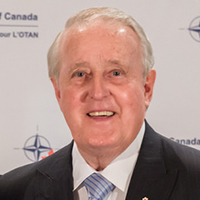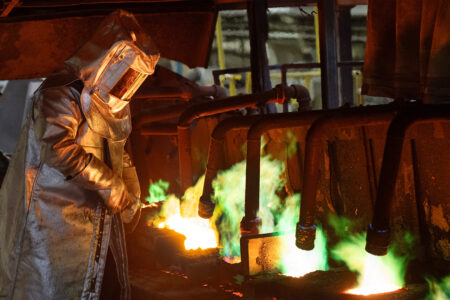
We live in a world where the events of the moment — whether in Crimea or Syria or Afghanistan — signal unrelenting pressures of instability, where the U.S. inclination and capacity to assert global leadership is on the wane and where the principles of multilateralism so helpful for the last half of the last century are now under assault.
It is easy to be pessimistic, easier still to want to turn inward. It is a world that, as Ian Bremmer describes, will be increasingly “every nation for itself.” National interests will be paramount.
The good news is that Canada is better positioned than many to take advantage of the fluid state of global affairs, provided — and this is a big if — we can get our act together to accentuate our strengths — notably our resource base and our energy capabilities in particular — to deliver prosperity and employment for Canadians for decades to come. And that is the big idea I want to discuss with you tonight…
Trade agreements are vital to access and to prosperity and I commend the government for its success on the negotiating front but you cannot sell what you cannot ship. Nor can you do it without the investments, the talent and a shared commitment from all who would be affected.
Put simply, we cannot market our resources globally if we do not have the infrastructure — political and industrial — to deliver them to market. That is precisely why we need a strong national commitment to build the infrastructure that will enable us to bring our abundance of natural resources — our most vital comparative advantage — to global markets, notably to the dynamic Asian economies where much of global growth is occurring.
We need pipelines to carry our crude oil to our west and east coasts. And we definitely need to see the Keystone XL pipeline approved. A negative verdict by the U.S. government would contravene a major tenet of NAFTA under which the U.S. was guaranteed unfettered supply in exchange for unfettered access by Canadian exporters to its market.
We also need urgently to quicken the pace to build pipelines and refining facilities on the west coast enabling us to ship LNG to markets that need supply. Australia and the U.S. are already beating us to the punch. The former is experiencing a surge in LNG exports boosted by rising demand and prices in Asia. Forecasts show that Australia’s gas output will jump to about 100 million metric tons by 2018, or about as much as Japan and Taiwan together consume in a single year. The U.S. is also seizing opportunity in the Asia market with big LNG importers such as Korea Gas and Japan’s Osaka Gas signing long-term agreements with U.S. terminals.
We have to understand that, while demand for much of what we have is strong, we operate in a highly competitive global market…
The U.S. will continue to be our most important market but one lesson we have learned from the hassle over Keystone is that we cannot rely exclusively on the U.S. for any export. Just imagine though, a positive verdict on Keystone that could be a catalyst for broader cooperation on energy between Canada and the U.S. If we decide first to get our own house in order, we could engage the Americans from a position of strength and relevance, making energy independence in North America a near term reality and generating significant capacity for influence in world affairs.
The biggest beneficiaries would be our two economies. We both need energy to support industrial expansion. While we will be competitors in some global markets that should not preclude deeper integration. Our combined energy potential could actually be harnessed to help change the geopolitical dynamic in Europe, Asia and the Middle East.
We have an abundance of resources that is second to none. We have the capacity for technological innovation that will enable us to ensure both energy security and environmental responsibility. I can envisage a new North American Accord on Carbon Emissions, one that invokes the spirit of what we did successfully together to combat acid rain and to clean up the Great Lakes, huge environmental achievements.
We could agree on identical goals but use prescriptions for carbon reductions that recognize the distinct nature of our respective resource assets and do not discriminate unfairly against one another with standards that are essentially protectionism dressed up in an environmental cloak.
Our mutual objective should be to establish the world’s most efficient and reliable infrastructure for the production and transmission of all forms of energy while we set a new gold standard on environmental performance. Ramping up LNG exports can facilitate a reduction in the number of coal-fired plants in China and Asia — unquestionably the major menace today in terms of carbon emissions. As a welcome bonus, increased supplies of natural gas in North America may also help wean the U.S. off its heavy reliance on coal for power.
North America working together as a dynamic, coherent player would be much stronger engaging with China and the rest of the world. Energy sufficiency gives us greater independence to chart our own course and can be a source of real leverage with others. Standing together, North America can lead the world, but only with vision and real leadership from the top.
Never forget that, to get attention in Washington, you need to be relevant to America’s own agenda — domestic and global. Canada’s best asset and our best leverage in Washington should be our energy resources, not just because of what it can contribute to the U.S.’ economic prospects but also because of the heft it can give us with America’s global challenges and our own…
The test of true leadership hinges on judgments between risk and reward.
Change of any kind requires risk, political risk. It can and will generate unpopularity from those who oppose change. The choice for Canada in a fast-changing global environment is either to adapt quickly and take advantage of the changes happening or watch from the sidelines.
If we truly deliver, we will not only enhance our economic prospects but I am confident will also enable Canada to play a more relevant and effective role on geopolitical issues of the moment. We can truly “walk the talk” of a resource super power.
Photo: iStock









